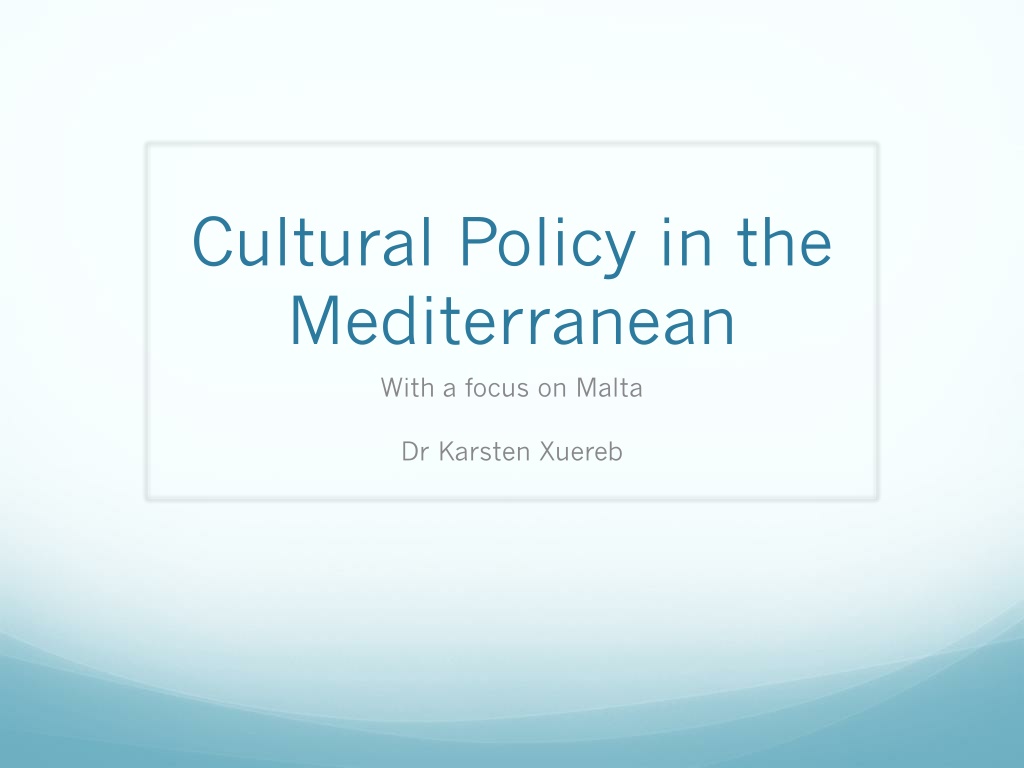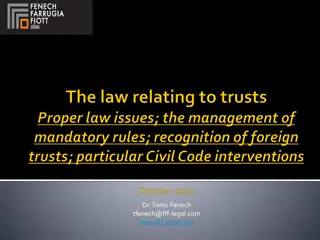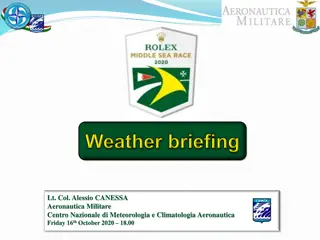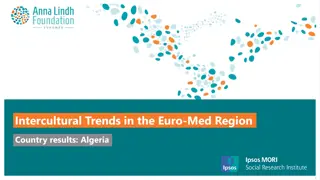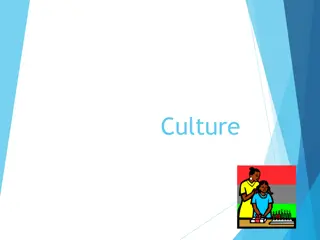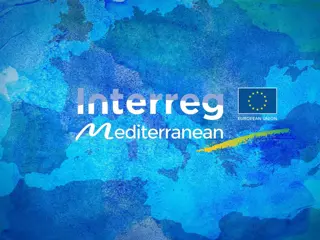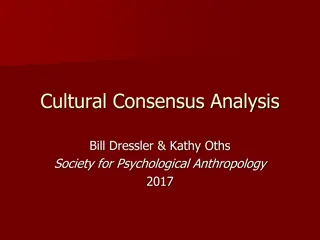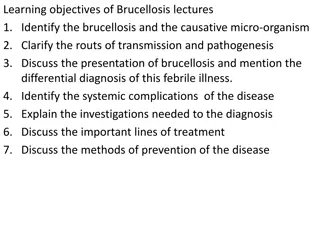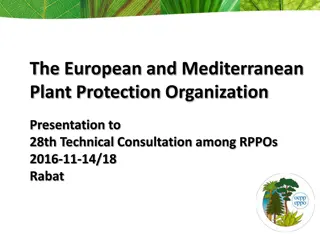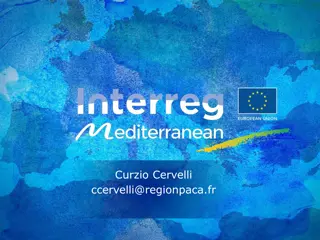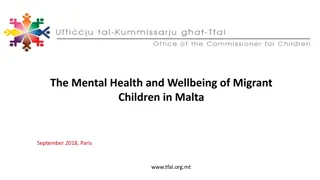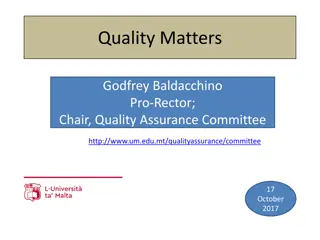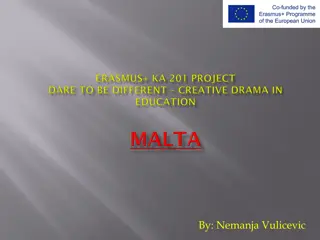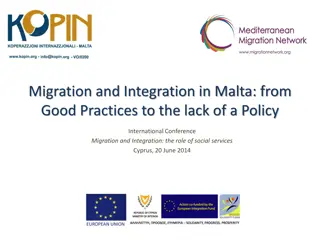Exploring Cultural Policy in the Mediterranean with a Focus on Malta
Delve into the intricate web of cultural relations in the Mediterranean region, centered around Malta. From historical and political insights to postcolonial influences and the role of cultural policy, this exploration sheds light on the complexities and nuances shaping the cultural landscape. Discover how regional, national, and supra-national bodies contribute to the evolving cultural policy framework, offering a glimpse into the competencies and collaborations that drive cultural initiatives.
Download Presentation

Please find below an Image/Link to download the presentation.
The content on the website is provided AS IS for your information and personal use only. It may not be sold, licensed, or shared on other websites without obtaining consent from the author. Download presentation by click this link. If you encounter any issues during the download, it is possible that the publisher has removed the file from their server.
E N D
Presentation Transcript
Cultural Policy in the Mediterranean With a focus on Malta Dr Karsten Xuereb
The Mediterranean space Map of Med
The Mediterranean space Bringing together different layers of social relations, including: Historical relations Political relations Economic relations Cultural relations
Is the Mediterranean a region? After Michael Herzfeld in W.V. Harris (2005)
Is the Mediterranean a region? Yes: particular characteristics, including: Geography Environmental challenges Cross-cultural & religious aspects No: not coherent or unified: Politically Economically In dealing with challenges
The postcolonial context Shadow of colonialism on today s Mediterranean cultural relations British French/la francophonie Other European, global? Manifest or covert/indirect related to economic development Culture: can ever be neutral/uncontested?
Cultural policy perspectives Raymond Williams on ordinariness J. Mark Schuster (2002)
Where does cultural policy fit in all of this? Various exercises at mapping cultural policy on regional level, but truly a collection (compendium) of national or sub-national ones There are supra-national bodies that address cultural policy, including: EU Anna Lindh Foundation Various Euro-Med processes and frameworks (Union for the Mediterranean; EMUNI; UNESCO etc)
Cultural competencies Competencies: what you can do with different tools Cultural competencies: in the EU, national competencies, international collaboration, international funding, also with third countries through protocols Non-EU: national, seek collaboration with EU, and funding
Main aims of cultural policy Policy-setting to achieve particular goals: Social: Wellbeing Inclusion Educational Economic: Employment Regeneration
Policy in the Mediterranean today Strong link with regeneration of urban spaces: E.g. European Capital of Culture, Arab Capital of Culture Strong link with tourism through: History Heritage (tangible and intangible) Events Contemporary culture
Venice as a case study Enter image Venice with cruise liner
Venice as a case study The medieval and early Renaissance regional powerhouse of Venice still attracts attention by: Capturing people s imagination through historical references Combining past with present through contemporary manifestations in historical venues that have been regenerated E.g.: Venice Biennale (art, architecture, film) Strong point: visibility, familiarity, still innovating Weak point: resting on laurels? Others quicker? (Pierluigi Sacco)
Tunis as a case study Enter Tunis image: Sidi Bousaid?
Tunis as a case study Tunisia dealing with effects of global Islamic terrorism e.g. Bardo and Sousse attacks in 2015 leading to collapse of tourism industry Cultural initiatives supporting foreign investment and international collaboration e.g. Dream City Strong point: young population, potential for education and employment Weak point: terrorism threat, economy slow
Malta as a case study Enter image of Malta (Valletta)
Malta as a case study Enter picture of China presence in Valletta: PTR or St James
Malta as a case study Relatively young nation: 1964 Rich colonial past, but also heavy on heritage: living on a monument (Jon. P . Mitchel 2012; common to Mediterranean heritage cities, like Rome) Struggles to manage different currents, and resulting tensions: Population growth Tourism Environmental impact Cultural identities
Malta as a case study (2) The strong financial and economic scenario helps make investment available But legacy- and sustainability-thinking lacking Biggest losers: environmental matters, urban planning, poverty divide, lack of strategic development Cultural policy: effective to address these matters, but is it its role?
Malta as a case study (3) Cultural policy should not be a substitute for education, social and environmental policies To contribute to society, cultural policy needs a few elements, including: Arm s length and professional governance Enabling routes to funding/sponsorship (fishing rod better than basket of fish) Capacity building International networking Long-term vision
Conclusion Cities in the Mediterranean are developing a strong identity: e.g. territorial diplomacy Challenges are common: educational, environmental, social, urban Censorship: political, economic, other? Opportunity: young populations, migrant populations, technology
One final thing: a visual representation of Malta Trailer from the film Simshar Not many indigenous films in Malta Film industry is more of a service industry Local realities that resonate with regional and global ones: migration, religion, social tensions, economic challenges
Thank you! https://culturalpolicy.blog
